Relevant Overviews
- Fediverse
- Content Strategy
- Online Strategy
- Social Media Strategy
- Content Creation & Marketing
- Online Architecture
- Digital Transformation
- Thinking tools
- Zettelkasten
- Learning from Andy Matuschak
- Personal Productivity
- Innovation Strategy
- Communications Tactics
- Psychology
- Social Web
- Media
- Politics
- Communications Strategy
- Science&Technology
- Business
Overview: Thinking tools
Intro: why this overview?
I first came across the interrelated concepts overviewed here after launching myhub, and realised I'd been developing similar ideas as far back as 2013, when I first piloted this Hub on Tumblr (see Why you need a Personal Content Strategy). My ideas for MyHub evolved as a result - I now see:
- the user's public hub as the part of their Second Brain which they share with the outside world using the ActivityPub open web standard for decentralised social networks (aka Fediverse - see related Overview)
- the underlying MyHub content management system evolving into a Thinking Management System, with content productivity and creativity tools integrated within it.
As far as I know this hasn't yet been done: creators are currently supposed to do their thinking in Obsidian, Roam or some other "thinking tool" software, and then publish their content using Wordpress, and then share it via Twitter. Why not make your public website - and the writing on it - a seamless extension of your second brain? And why not network it with other second brains via the Fediverse?
Why not make your public website - and the writing on it - a seamless extension of your second brain?
To turn these ideas into reality, however, I need to do a deep dive into thinking tools. I'm using my current personal content strategy - ie:
- refocusing my Priority Sources (newsletter filters, Highlights Twitter List, etc.) on sources of high-quality content about thinking tools
- queueing the best content they publish on a daily basis
- reading and annotating it on a daily basis
- reviewing that content on a weekly/fortnightly basis, and updating this Overview as required
- developing my own ideas in the form of notes, newsletters and posts.
More: Simplifying Zettelkasten by working out loud
This Overview is therefore a crucial part of this process: it provides both a summary of what I have discovered in this space so far, and (below) a search result of the content I read when developing this Overview (stuff I Like), and the content I wrote and built as a result (stuff I Think and Do). In other words:
- I'm using my personal content strategy processes to explore directions for MyHub's evolution
- I'm using my current Hub to test how well its features support those processes today, and how they evolve
- the rest of this Overview is a continual work in progress, written primarily for myself. If you want to see what I've written, then jump straight to All the Stuff I Do or Think about Thinking Tools, Anytime.
Key concepts
(Last update: 31/10/2021): When I created this overview I identified 10 pre-existing tags to use as a baseline: inbox zero, spaced repetition, 2ndbrain, fedwiki (for federated wiki), mindfulness, mindhack, (information) overload, roamresearch, weekly review and zettelkasten. That pulled in 44 resources, each with at least one of those tags.
(Feature idea: AI & visualisation tools integrated into my backoffice to help better surface concept clusters and the explore links between them).
Some notes on the major concept bundles:
- Second Brain (2ndbrain): essentially a synonym for thinking tool (which I use, as I prefer verbs over nouns)
- Productivity, GTD, Mindfulness: while a lot of the resources tagged mindfulness paint it as a racket, I still want a thinking tool that replaces FOMO with the serene confidence that my thinking tool has (a) captured the content I need to read, the stuff I have already read & the ideas I've already had; and (b) will easily surface it when I need it. It must support personal Getting Things Done (GTD) processes rather than become a GTD tool: it'll have a reading queue, for example, and hopefully provide a stream of ToDos to external task management tools.
- Zettelkasten, Knowledge Management, Creativity, Ideation: the Zettelkasten personal knowledge management (PKM) technique will be a building blocks of the MyHub thinking tool, which is why I created an entire overview on it. My zettelkasten is currently distributed across several IT tools: this Hub (public bibliographic notes and other public content - i.e., the stuff I Like, Think and Do); Pocket (my reading Queue): Asana (ToDo mgt) and fleeting/permanent notes (Roam Research). While it works as a whole, it's hard to connect the dots between these different siloes, so I'll be exploring other tools as I develop this overview.
- (Personal) Content strategy: content strategy is itself an important tag on my Hub (188 resources and counting) as it's a major element of most of my professional consulting gigs. In this context, however, the focus is on personal content strategy: what sorts of content are important to you, where do you put that content, how do you manage it, which types do you share, and how? While there's a major overlap with personal knowledge management, you need a personal content strategy first, as it defines the needs.
- Annotation, Curation: If you annotate (make notes on) what you read as you read it, you're more likely to absorb the knowledge within it and apply that knowledge to your life. If you curate it (tag it) as well, you're more likely to find it again when you need it (assuming you have a half-decent knowledge management tool), alongside your own ideas and other notes (also tagged). Most people tag these notes in their thinking tool, which is private. By integrating thinking tools into MyHub, users will be able to keep some notes private and share others as part of their personal content strategy (next).
- Progressive summarisation: successively summarising knowledge to better improve understanding and memorisation. This and other Overviews provide a simple example: after summarising each resource as I annotate it into my Hub, I summarise the knowledge of multiple resources in an Overview.
- Fediverse: a "collection of interoperable social networks built on Open Web standards... [including] Twitter-lookalike Mastodon and YouTube-lookalike PeerTube", according to my dedicated Overview. It's here as well because linking Hubs together via Fediverse standards would allow users to expand their thinking tools to include the notes publicly shared by other Hubs, Mastodon & PeerTube accounts, etc. Moreover, those accounts would also be able to follow Hubs.
Key elements
Different tools have different elements, but here are some of the most important and/or common ones.
Flexible/difficult vs. inflexible/easy (aka 80/20 rule)
The 80/20 question (aka the Pareto principle) is central to productivity, and applies to many software tools - do you design it:
- to be used in only one way: this makes it really easy to get started, but difficult/impossible to customise to your needs
- or as a toolbox: each user can customise to its specific needs, but only after a lot of work?
The flexible/difficult approach is IMHO best illustrated by roamresearch: it's enormously powerful and flexible, but to take advantage of that you need to dive deep and geek out on templates and other plug-in code developed by 3rd parties. If you don't - like me - you end up with a lot of notes, but you're not harvesting the true power of your second brain. For me it fails the 80/20 rule: too much effort to get something useful out of it.
Bidirectional links
Extremely powerful feature. In essence, it means that linking from page A to page B adds a link from B back to A, but there's a lot more to it than that. I'm currently most familiar with Bidirectional links from roamresearch, where every page is designed like a Zettelkasten overview, and there's a page for every tag.
To be continued.
Blocks vs. pages
Does the tool use pages to manage knowledge? Or is a page simply a collection of blocks, each with its own unique identity, allowing you to find and manipulate it separately from the page in which it was first created?
Again, I understand this question principally through the optic of roamresearch, which takes the latter approach. To be continued.
Tools to explore
See: resources tagged #2ndbrain and #tool. I am currently migrating from RoamResearch to Obsdian, but you can't throw a stone without finding another one being launched.
---
Automated links to recent, relevant Highlighted Resources follow.
---
Relevant resources
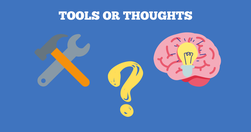
Articulates exactly my problem with most Tools4Thought, hence the "super simple Thinking Tool" I want at the heart of myhub's CMS."Perhaps something as simple as having the word ‘Tool’ first causes us to focus on the tool more than the thinking... to confuse thought as an object rather than thought as a process... [causing us t…

"the underlying problem is stubbornly intractable"Great piece, although I'm unsure that "a great proportion of the variance in “knowledge management” effectiveness across individuals is genetic", it is true that:productivity geeks exist, develop their system and then try to sell it.speaking from experience, it is really, r…
Introductory Adjacent Possible essay on "building the most effective creative workflow", starting with a good definition of "“tools for thought”: using the computer not just to compose your thoughts... but instead as a tool for having more interesting thoughts in the first place... software that helps you generate ideas, remix them …
Andy Matuschak's daily routine and content strategy appear similar, but much more complex, than my own. It starts with something we share: "When my days don’t go well, it’s often because something derailed me in the morning, and I never really got back on track", and manages his day so that he spends the first two hours of the day f…
Having fun using Andy Matuschak's wonderful site to explore his innovative ideas on note-taking, zettelkasten, writing, etc. This link opens a number of his interrelated notes, displayed horizontally using his innovative 'stacked notes' information architecture.Key ideas from this stack:the importance of 'task division' in…
Here's a good question: "If we carefully closed the right feedback loops, could we construct a creative flywheel that generates finished works?... knowledge gardening. You collect and plant idea seeds, returning periodically to water and weed... As a kind of self-organizing system, it can’t happen without some kind of feedback loop... …
Subconscious is "a creative oracle that helps provoke ideas. It also captures those ideas, and remixes and resurfaces them, provoking more ideas... in a feedback loop that powers a flywheel of divergent creative thinking."Whereas spaced repetition tools like Anki "close feedback loops to help memorize facts", Subconscious will …
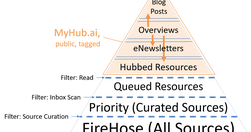
What did I learn about learning as I explored using Zettelkasten idea and knowledge management to write five newsletters about disinformation in the 2020 US elections?
"A serendipity engine on the Twitter sidebar".A "second brain" provides easy access to all the resources you've ever Liked or ideas you've ever Thought. @ExGenesis' Threadhelper brings a subset of this (just Tweets) right into the twitter UX - it looks brilliant.Check out the video: https://www.youtube.com/watch?…
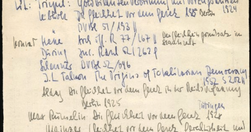
Books on note-taking... always too vague and boring, full of platitudes ... never an overarching system for turning notes into concrete results ... [but]How To Take Smart Notes ... is by far the most impactful and profound book I’ve ever read on the subject... most books are a few morsels of real insight wrapped in... fluff... I systematically unr…
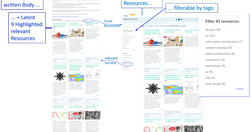
I needed to review everything I had ever Hubbed relevant to surveillance capitalism, polarisation, social media and society... As I cast around for something interesting to say, I realised a MyHub.ai Service Page could help organise and clarify my thoughts: I would use it to create a Zettelkasten Permanent Note...While not a blog post, it is defin…

Luhmann... published more than 70 books and over 400 scholarly articles... one of the most important sociologists of the twentieth century ... “I’m not thinking everything on my own. Much of it happens in my Zettelkasten”...adopt his method and ... learn better, think better, publish more, and be more creative... A Zettelkasten is ... a box of not…

“If your job consists of Tweeting for someone else, you owe it to yourself to think of something else in 2018. Particularly if you’re under 35."It’s early January, and so time to add to the slew of “What you should do in 2018” posts sloshing around the Net.

Many famous scientists have something in common—they didn’t work long hours... lives were full and memorable, their work was prodigious, and yet their days are also filled with downtime... great students didn’t just practice more than the average, they practiced more deliberately... engaging with full concentration in a special activity to improv…

"the majority of participants reported that they found it unpleasant to be alone in a room with their thoughts for just 6 to 15 minutes.... in one experiment, 64 percent of men and 15 percent of women began self-administering electric shocks..." How our mobile-phone-driven flight away from idletime and interiority damages our psychology, physical…
Relevant Overviews
- Fediverse
- Content Strategy
- Online Strategy
- Social Media Strategy
- Content Creation & Marketing
- Online Architecture
- Digital Transformation
- Thinking tools
- Zettelkasten
- Learning from Andy Matuschak
- Personal Productivity
- Innovation Strategy
- Communications Tactics
- Psychology
- Social Web
- Media
- Politics
- Communications Strategy
- Science&Technology
- Business